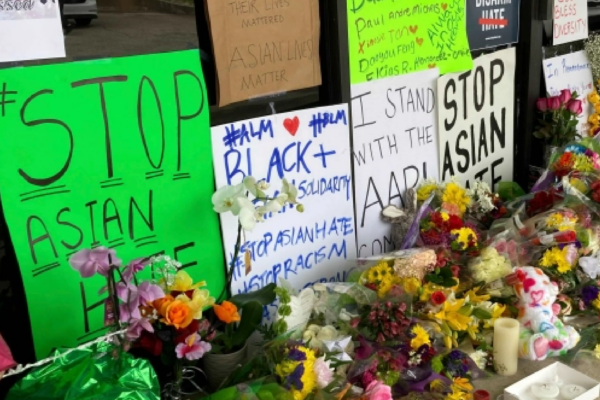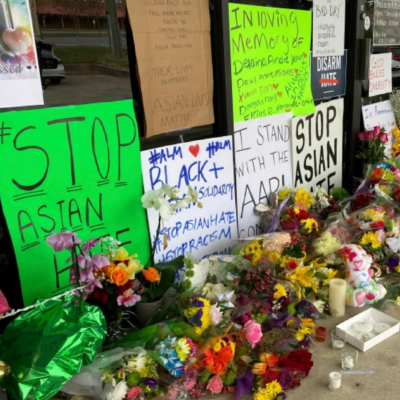One year ago, the Asian-American community was confronted with emotions of anxiety, isolation, confusion, fear, and complete anger. On March 16, 2021, a gunman entered three Asian-owned establishments in Atlanta and murdered eight people, six of whom were Asian women. Those killed were Xiaojie “Emily” Tan, 49; Daoyou Feng, 44; Delaina Yaun, 33; Paul Michels, 54; Suncha Kim, 69; Soon Chung Park, 74; Hyun Jung Grant, 51; and Yong Ae Yue, 63.
After the capture of the gunman, the Cherokee County Sheriff’s Office claimed he was having “a really bad day.” Further, the Cherokee County District Attorney claimed this mass shooting had “no evidence of racial biases,” despite racist, anti-Asian posts on the gunman’s social media, including ones about “the China virus.”
Violence, hate, and discrimination towards Asian Americans and Pacific Islanders (AAPI) in America has a long history, but it took a mass shooting in a major city like Atlanta for the media and many Americans to finally acknowledge this reality. Since the coronavirus was first reported AAPI have been targeted and treated as scapegoats solely based on their race, exacerbating existing anti-Asian sentiment that many chose to ignore until now.
Stop AAPI Hate, an advocacy group working to promote a safer existence for AAPI people, received over 10,000 documented reports of anti-AAPI instances between March 19, 2020, to September 30, 2021. One in 5 Asian Americans have experienced race-based hate in the last twelve months. Despite these alarming numbers in the wake of the murders in Atlanta, the same criminal legal system designed to harm all people of color is trying to gaslight the AAPI community and deceive white America by claiming there was no racial bias behind these gruesome murders.
I am a one-and-half generation, self-proclaimed Filipina Kentuckian. I call Kentucky home, but in a state with a small AAPI population I often find myself feeling isolated from people with similar experiences and emotions relating to race-based violence and trauma. However, I was recently reminded that violence against Black, Indigenous, and people of color (BIPOC people) is not new and takes many forms. The legacy of slavery and colonialism created societal and cultural barriers for BIPOC individuals to connect. Much of the violence and discrimination is used as a tool of white supremacy to divide BIPOC Americans and hinder our ability to build collective power, similar to how some politicians use racist rhetoric to divide white working-class voters from BIPOC working class voters. Colorism and anti-Black racism exist within the AAPI community, and a parallel type of discrimination happens when anti-Asian biases and rhetoric cross racial lines. Despite this, we must remember that as people of color in America we have more in common than we have differences.
To help bridge these divides, Representatives Nima Kulkarni and Keturah Herron have come together to draft House Resolution 123 to honor those killed one-year ago and acknowledge the desperate need to address gun violence in our communities.
Representatives Kulkarni and Herron are a prime example of what we must do if we want to build power and create a better world for our children. Representative Kulkarni moved from India to Louisville when she was 6 years old and is now a pillar of her community. Representative Herron is a native Kentuckian and the first openly LGBTQ state representative. They are both 2 of only 32 women and 10 people of color in the entire 138-member Kentucky General Assembly.
It’s for this very reason I identify as an immigrant, Asian American, Filipina, BIPOC Kentuckian, and, recently, Louisvillian. It is imperative that we see each other and our own identities as multi-dimensional to foster connection and expand our communities. We, as BIPOC people, have all experienced generational and individualized harms from a system made to reinforce white supremacy. Out of survival, we – as an AAPI community and as a BIPOC community as a whole – must remove barriers, biases, and prejudices against each other so we can stand together in solidarity. They cannot ignore us when we are many.


